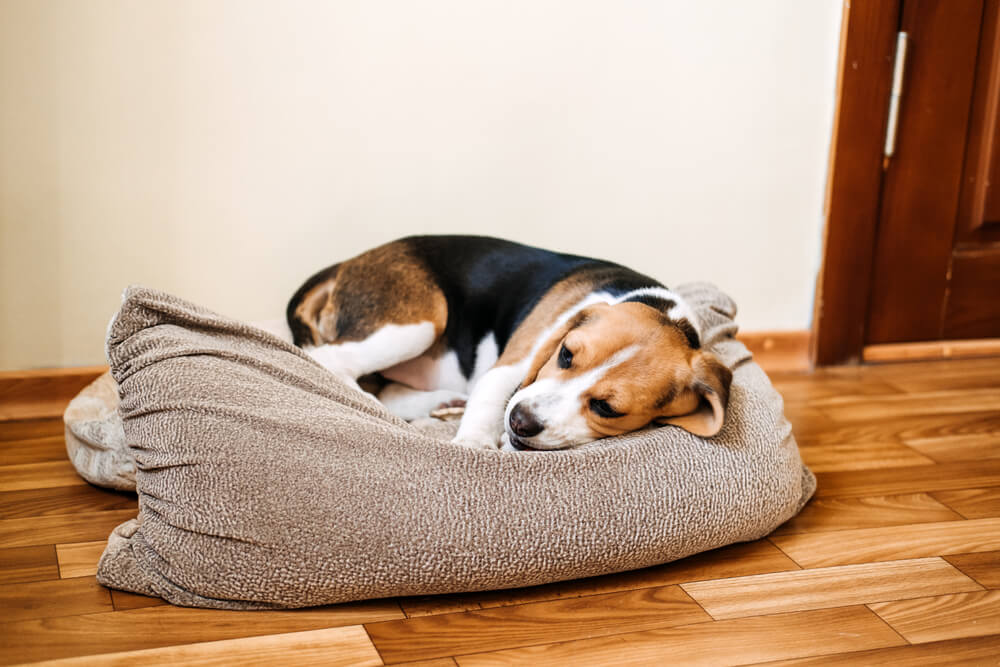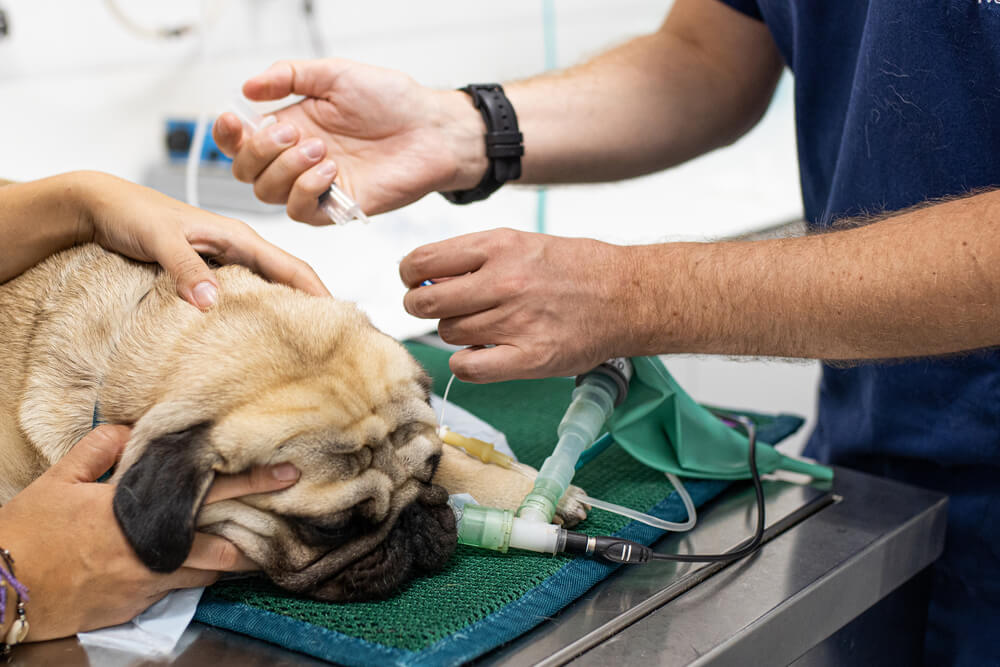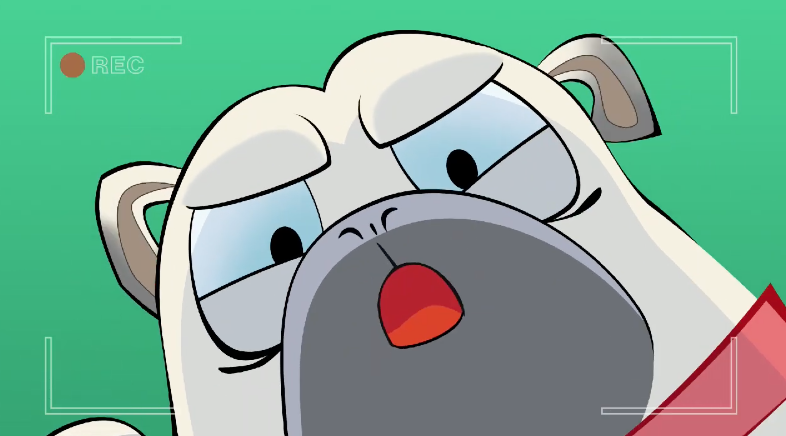















 Back
Back
Can Dogs Get Concussions?
Concussions, a common traumatic brain injury, can occur when dogs experience head trauma and lead to a range of symptoms and complications. Read on to learn more about keeping your canine’s cranium safe.

Writer Animalia Team

Yes, our pups are just as susceptible to traumatic brain injuries as we are. Unlike human beings, however, dogs can’t communicate when they’ve suffered a bump to the head or when they’re feeling unwell.
Concussions can be caused by anything from a car accident to a collision in the yard so responsible dog owners must recognize risk factors, symptoms, and preventive measures.
What is a canine concussion?
A concussion is a common, sometimes serious, brain injury that occurs when a sudden blow or jolt causes the head and brain to move or change direction dangerously fast.
Many canine breeds are pretty robust, with even thicker, more protective skulls than the average human. Nonetheless, they’re still prone to head injuries. In most cases, dogs recover from a concussion, but their prognosis depends on the extent of the injury and any complications that arise afterward.
It’s important to seek out treatment as quickly as possible if you notice any signs of a concussion in your dog. As with people, an untreated head injury can lead to swelling of the brain and internal bleeding. This can turn a minor injury into a life-changing or even deadly one.
The causes of concussion in dogs
As with humans, head trauma is the common cause of concussion in dogs. Car accidents tend to be the primary culprit. Everyday antics, however, can also take a turn for the worse and lead to injuries. A boisterous pooch can give themselves a concussion just by roughhousing with fellow pets or unexpectedly colliding with a wall. Concussions in puppies typically occur when a dog is dropped or during rough play with family members or larger animals.
Owners aren’t always there to witness the events that lead to concussions. As such, it’s important to look out for telltale signs and symptoms to lead the way to a speedy diagnosis and effective treatment.
Common signs of concussions in dogs
There are many signs of concussion in dogs to watch out for. As with humans, one of the most obvious dog concussion symptoms is decreased activity. Is your pet more lethargic than usual? Have they suddenly become disinterested in their favorite toys or unenthusiastic about their meals? All of this may suggest they’ve suffered a head injury and are struggling with a concussion.
Other symptoms include vomiting and difficulty standing up. Though there are several conditions that can cause nausea and an unsteady gait, the combination often points to a concussion. Sleepiness may also indicate recent head trauma. Some dogs love to doze, but watch out if a spry dog suddenly prefers nap time to playtime.
They say the eyes are the windows to the soul. It’s impossible to say whether that’s true, but they offer a window into your dog’s health. A quick look at their pupils is often enough to diagnose a traumatic brain injury. Are they the same size? A concussion may cause one to look bigger than the other or even both to be dilated or very small.
Seizures are another especially jarring sign of a potential concussion. Seek veterinary care immediately when your pet is suddenly afflicted with tremors or seizures.
Much harder to spot are the behavioral changes that could accompany a concussion. Nobody knows your dog better than you do, so keep your eyes peeled. Are they suddenly acting a little strange? Talk to your veterinarian.
Canine concussions: what to do
If you think your dog is displaying symptoms of a concussion, you need to act quickly. The first thing to do is ensure they remain as calm, cool, and collected as possible. If your dog is running around the yard, bring them indoors to a quiet space where they can rest and you can observe them more closely. Calming your dog down not only prevents further stress but also lets you take charge of the situation. Once your dog is calm, look for visible signs of an injury. If you notice something obvious like an open wound, it’s time to call the veterinarian and arrange an emergency visit.
If your dog has suffered a particularly nasty accident, such as being hit by a car, you will need to be very careful when handling them. If they’ve lost consciousness, enlist the help of a friend or family member to safely move them to your car.
Can dogs sleep after a concussion?
It’s not a good idea to let your dog sleep after suffering a head injury. Even if a head injury seems minor, you’ll want to keep your dog awake for a few hours to monitor symptoms and look out for signs of a concussion. When in doubt, consult a veterinarian. They may suggest you bring your pooch in for a full checkup. If not, they’ll give you a clear idea of how long to wait before letting our canine hit the hay for the night.

Are specific dog breeds more prone to concussions?
Any dog can suffer a concussion, but some breeds are more susceptible than others. Generally speaking, it’s smaller breeds with less robust skeletons that are more likely to suffer concussions. Toy breeds with dome-shaped skulls are at the most risk. Smaller breeds like Shih Tzus, Dachshunds, and Chihuahuas all have open fontanels. In other words, their skulls aren’t fully fused. If any of these breeds experience a head injury, they’re more likely to suffer from traumatic brain injuries.
Treatment
If dogs are experiencing nausea they may avoid their water bowls. Coupled with vomiting, avoiding water can quickly lead to dehydration. Your veterinarian may administer IV fluids to quickly address symptoms. In some instances, a dog may need oxygen treatment to help with their breathing. If there’s any indication of swelling in the brain, your veterinarian will work quickly to give medication to try to reduce the swelling.
In very extreme cases, surgical intervention may be required to address concussions. If head trauma has caused a bleed within the brain or if there’s a major skull fracture, surgery is often the only effective treatment.
Once a veterinarian has carried out a diagnosis and treatment, they’ll advise you on the next steps. While sleeping in the immediate aftermath of a head trauma isn’t recommended, your pooch will eventually need to rest and recuperate.
All dogs will need careful monitoring in the event of head injuries.
Concussion prevention
If your household is a busy one, avoiding the occasional accident is almost impossible. There are, however, several steps you can take to prevent concussions and other serious injuries.
The most dangerous concussions are usually the result of car accidents. When walking your dog, make sure it can’t stretch too far on the leash, especially when you’re in the vicinity of busy roads. Never use retractable leashes. Many dog owners assume their pets are safe and sound while confined to their yards. Unfortunately, some dogs are skilled escape artists. If your pet has a history of playing Houdini, take stock of your outside areas and reinforce fences where needed.
If your dog regularly travels in the car with you, don’t let them sprawl out in the backseat. Just like kids, pets should be safely strapped in while traveling in vehicles. Pet seat belts and harnesses are a sound investment for larger dogs. Your vet may have some tips on making the right selection. If you’re on the move with a smaller dog, consider investing in a carrier. No matter how secure your dog seems, keep a close eye on them as you drive from A to B.
Worried about keeping your puppy safe as they grow? If you’ve only recently brought home your new pet, it’s the perfect time to invest in pet insurance. Get a quote from Animalia today to learn more about a policy that can help you provide the highest possible level of care throughout your dog’s life.





We offer the most comprehensive coverage
out there
Having Animalia is like a top-of-the-line
Rolls-Royce with a swimming
pool in the trunk.



Get your pet insurance quote
Pet type
- Dog
- Cat
What is your pet's name?
Zip code





